Quotes About Bakhtin Polyphony
Enjoy collection of 33 Bakhtin Polyphony quotes. Download and share images of famous quotes about Bakhtin Polyphony. Righ click to see and save pictures of Bakhtin Polyphony quotes that you can use as your wallpaper for free.
The idea is distributed in space. It isn't only in one part; one part can't express the idea any longer, only the union of parts can completely express the idea. The idea found it necessary to be presented by several parts. After that, there was a rapid flowering of polyphony. ~ Anton Webern

This is a profoundly universal laughter, a laughter that contains a whole outlook on the world. ~ Mikhail Bakhtin

Carnival is past millennia's way of sensing the world as one great communal performance. This sense of the world, liberating one from fear, bringing the world maximally close to a person and bringing one person maximally close to another (everything is drawn into the zone of free familiar contact), with its joy at change and its joyful relativity, is opposed to that one-sided and gloomy official seriousness which is dogmatic and hostile to evolution and change, which seeks to absolutize a given condition of existence or a given social order. From precisely that sort of seriousness did the carnival sense of the world liberate man. ~ Mikhail Bakhtin
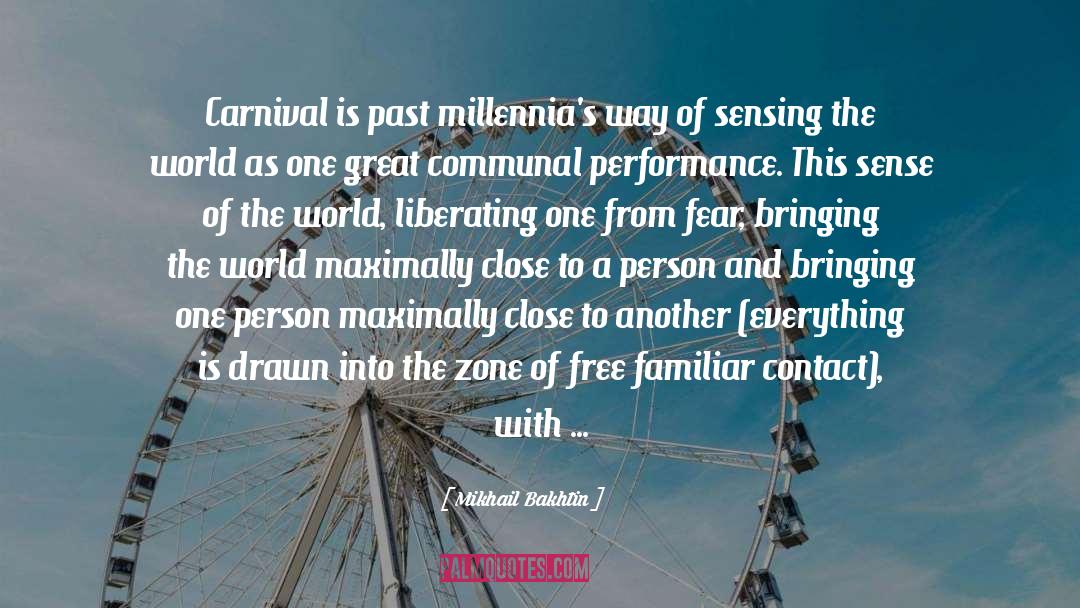
But in fact Dostoevsky found and was capable of perceiving multi-leveledness and contradictoriness not in the spirit, but in the objective social world. In this social world, planes were not stages but opposing camps, and the contradictory relationships among them were not the rising or descending course of an individual personality, but the condition of society. The multi-leveledness and contradictoriness of social reality was present as an objective fact of the epoch. The ~ Mikhail Bakhtin
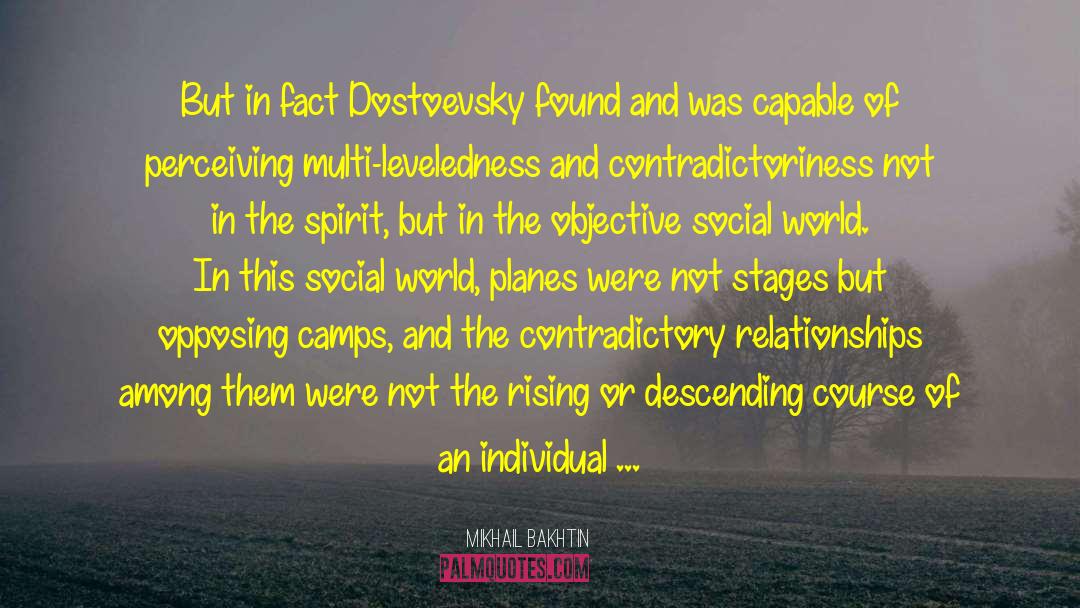
This relative freedom of a hero does not violate the strict specificity of the construction, just as the specificity of a mathematical formula is not violated by the presence of irrational or transfinite quantities. ~ Mikhail Bakhtin

14. Finally, the last characteristic of the menippea: its concern with current and topical issues. This is, in its own way, the "journalistic" genre of antiquity, acutely echoing the ideological issues of the day. ~ Mikhail Bakhtin

Especially in the Christian cult (wine and bread on the altar-tomb as the mystical body of Him Who Was Crucified, Who died and Who
was resurrected; the sacrament of new life and resurrection through food and drink). In the cultic redaction all elements of the complex appear not in a real but in a sublimated form, and are linked with one another not via a real-life narrative, but through mystic-symbolic links and interrelationships, and the triumph of life over death (resurrection) is accomplished not on a real and earthly plane but on a mystical one. ~ Mikhail Bakhtin

The movement of time is guaranteed by the birth of generation after generation, a never-ending succession that fills the gods with fear. ~ Mikhail Bakhtin

Whether it is Bach or Mozart that we hear in church, we have a sense in either case of what gloria Dei, the glory of God, means. The mystery of infinite beauty is there and enables us to experience the presence of God more truly and vividly than in many sermons. But there are already signs of danger to come. Subjective experience and passion are still held in check by the order of the musical universe, reflecting as it does the order of the divine creation itself. But there is already the threat of invasion by the virtuoso mentality, the vanity of technique, which is no longer the servant of the whole but wants to push itself to the fore. During the nineteenth century, the century of self-emancipating subjectivity, this led in many places to the obscuring of the sacred by the operatic. The dangers that had forced the Council of Trent to intervene were back again. In similar fashion, Pope Pius X tried to remove the operatic element from the liturgy and declared Gregorian chant and the great polyphony of the age of the Catholic Reformation (of which Palestrina was the outstanding representative) to be the standard for liturgical music. A clear distinction was made between liturgical music and religious music in general, just as visual art in the liturgy has to conform to different standards from those employed in religious art in general. Art in the liturgy has a very specific responsibility, and precisely as such does it serve as a wellspring of culture, which in the final ana ~ Benedict XVI
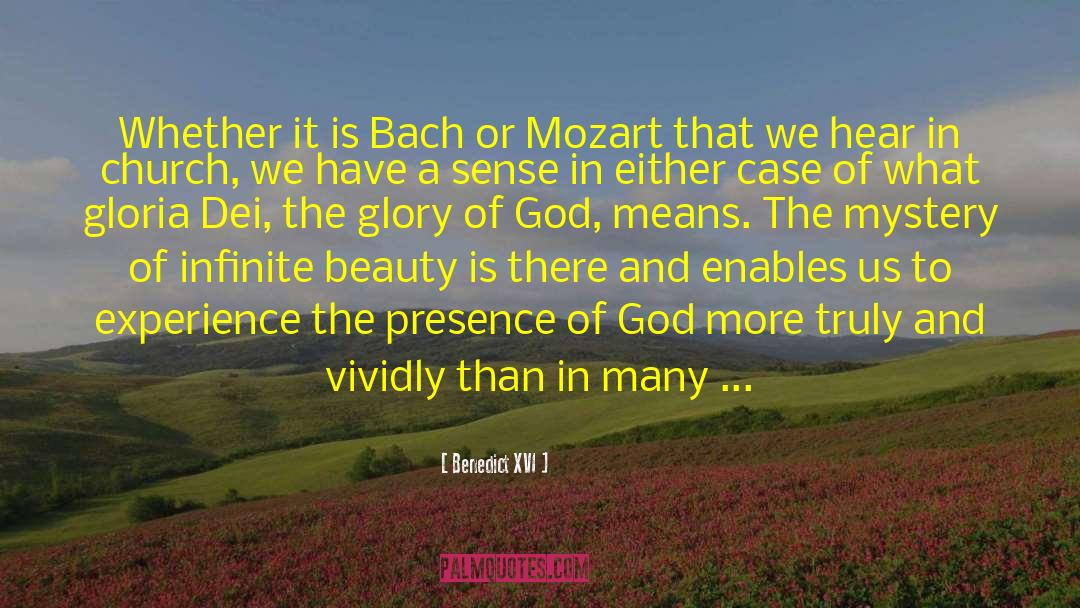
Nonsense,' said the Doctor, who was an inveterate underliner, a scribbler in margins, a very unpassive reader. Some of his oldest, most precious volumes in the TARDIS library were swamped by his commentaries from successive readings over the years. All of the Doctors had added their contributions - picking fights with the original author, then with each other as their various, hotly held opinions clashed and altered. To the Doctor, his own books were the place his previous selves met in a busy, textual polyphony. All his books were dense palimpsests of gripes. ~ Paul Magrs

All modern MIDI synthesizers are capable of polyphony, which means they can play more than one note at a time and more than one instrument at a time. ~ Charles Petzold

For me, anything can be music! I can get huge enjoyment and be moved totally by the purity and perfection of some Renaissance polyphony, but equally I can feel emotion in the expectant hum of a big old guitar amp just before the strings are hit. ~ Steven Price

Nothing is absolutely dead: every meaning will have its homecoming festival. ~ Mikhail Bakhtin

The events of my birth...and finally of my death are not accomplished in me or for me. The affective weight of my life as a whole does not exist for me. Only the Other is in possession of the values of the being of a given person. ~ Mikhail Bakhtin

In poetry, even discourse about doubts must be cast in a discourse that cannot be doubted. ~ Mikhail Bakhtin

A Russian philosopher, Mikhail Bakhtin said that "the self is the gift of the other" It seems to me most true now. The genes I carry, the clothes I wear, the food I eat all have come through the hands of others. Even those words I write now, my vocabulary, are not only mine. They are an agreement, a social contract between the two of us. ~ Rhonda Riley

A newly born genre never supplants or replaces any already existing genres. Each new genre merely supplements the old ones, merely widens the circle of already existing genres. For every genre has its own predominant sphere of existence, in which it is irreplaceable. Thus the appearance of the polyphonic novel does not nullify or in any way restrict the further productive development of monologic forms of the novel (biographical, historical, the novel of everyday life, the novel-epic, etc.), for there will always continue to exist and expand those spheres of existence, of man and nature, which require precisely objectified and finalizing, that is monological, forms of artistic cognition. But again we repeat: the thinking human consciousness and the dialogic sphere in which this consciousness exists, in all its depth and specificity, cannot be reached through a monologic artistic approach. ~ Mikhail Bakhtin

It is given to all of Dostoevsky's characters to "think and seek higher things"; in each of them there is a "great and unresolved thought"; all of them must, before all else, "get a thought straight." And in this resolution of a thought (an idea) lies their entire real life and their own personal unfinalizability. If ~ Mikhail Bakhtin

Carnivalization is not an external and immobile schema which is imposed upon ready-made content; it is, rather, an extraordinarily flexible form of artistic visualization, a peculiar sort of heuristic principle making possible the discovery of new and as yet unseen things. By relativizing all that was externally stable, set and ready-made, carnivalization with its pathos of change and renewal permitted Dostoevsky to penetrate into the deepest layers of man and human relationships. ~ Mikhail Bakhtin
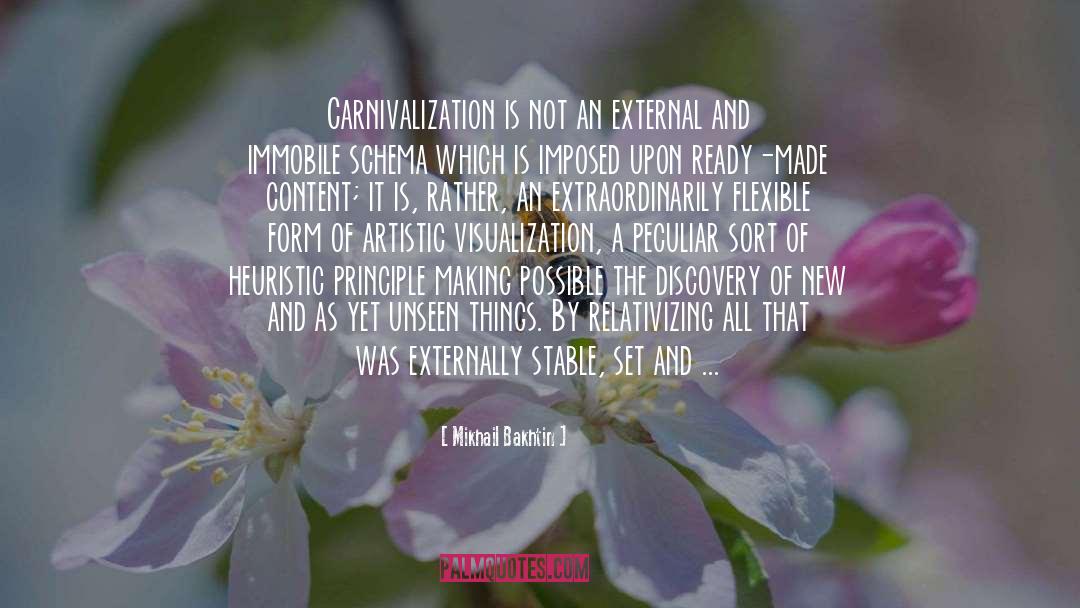
I find three basic characteristics that fundamentally distinguish the novel in principle from other genres: (i) its stylistic three-dimensionality, which is linked with the multi-languaged consciousness realized in the novel; (2) the radical change it effects in the temporal coordinates of the literary image; (3) the new zone opened by the novel for structuring literary images, namely, the zone of maximal contact with the present (with contemporary reality) in all its openendedness.
These three characteristics of the novel are all organically interrelated and have all been powerfully affected by a very specific rupture in the history of European civilization: its emergence from a socially isolated and culturally deaf semipatriarchal society, and its entrance into international and interlingual contacts and relationships. ~ Mikhail Bakhtin

There were quotations that were openly and reverently emphasized as such, or that were half-hidden, completely hidden, half-conscious, unconscious, correct, intentionally distorted, unintentionally distorted, deliberately reinterpreted and so forth. The boundary lines between someone else's speech and one's own speech were flexible, ambiguous, often deliberately distorted and confused. Certain types of text were constructed like mosaics out of the texts of others. ~ Mikhail Bakhtin
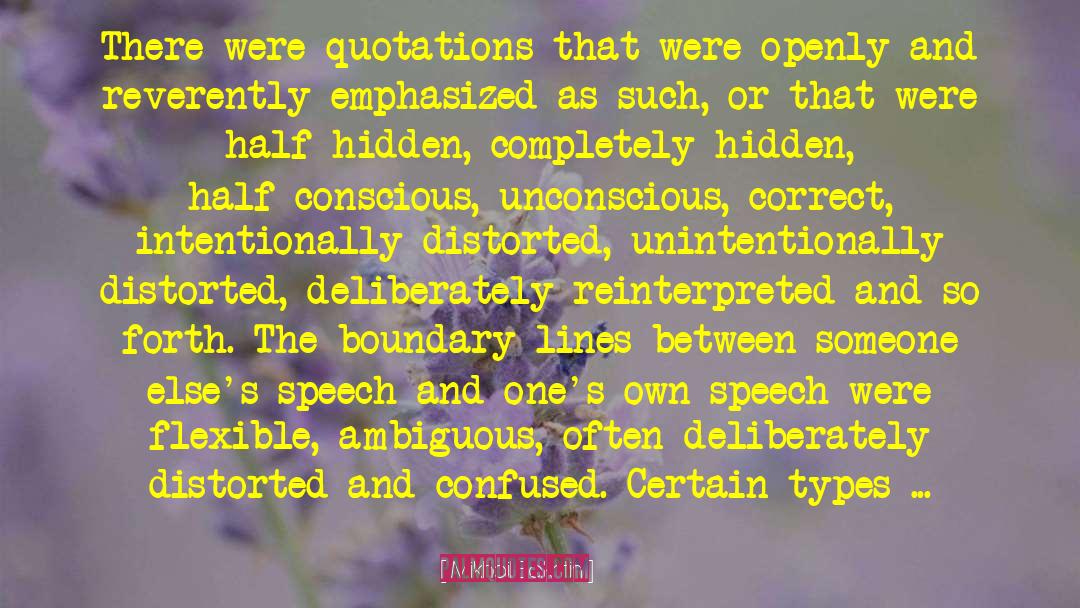
In rhetoric there are the unconditionally right and the unconditionally guilty; there is total victory and the annihilation of the opponent. In dialogue, annihilation of the opponent also annihilates the very dialogic sphere in which discourse lives... This sphere is very fragile and is easily destroyed... ~ Mikhail Bakhtin

Each novel presents an opposition, which is never canceled out dialectically, of many consciousnesses, and they do not merge in the unity of an evolving spirit, just as souls and spirits do not merge in the formally polyphonic world of Dante. ~ Mikhail Bakhtin
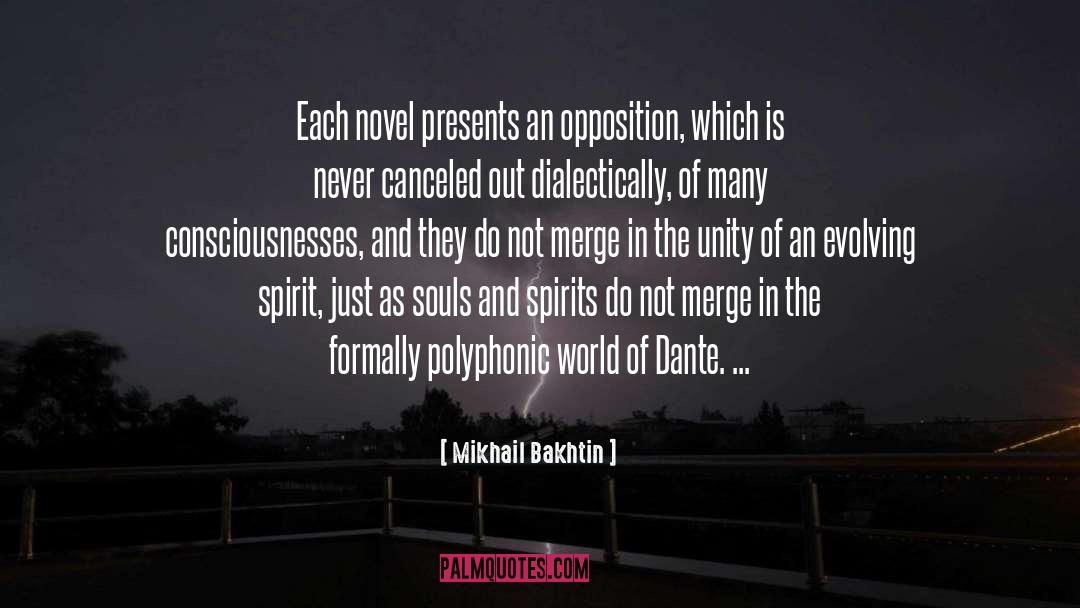
Where there is no passage of time there is also no moment of time, in the full and most essential meaning of the word. If taken outside its relationship to past and future, the present loses its integrity, breaks down into isolated phenomena and objects, making of them a mere abstract conglomeration. ~ Mikhail Bakhtin

The novel has become the leading hero in the drama of literary development in our time precisely because it best of all reflects the tendencies of a new world still in the making; it is, after all, the only genre born of this new world and in total affinity with it. ~ Mikhail Bakhtin
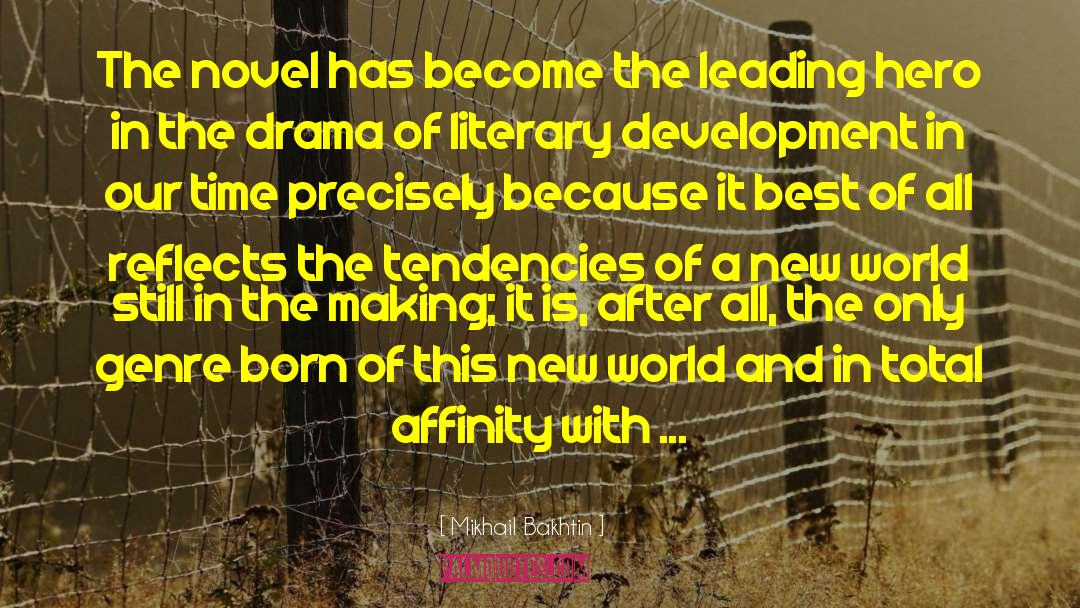
To think about them means to talk with them; otherwise they immediately turn to us their objectivized side: they fall silent, close up, and congeal into finished, objectivized images. ~ Mikhail Bakhtin
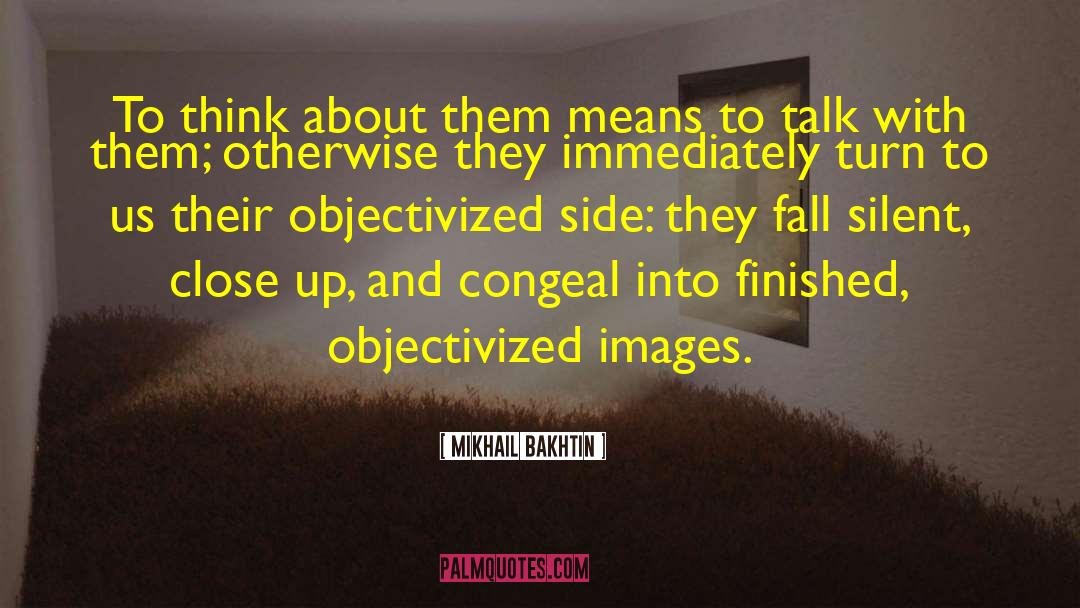
The primary carnivalistic act is the mock crowning and subsequent decrowning of the carnival king. ~ Mikhail Bakhtin
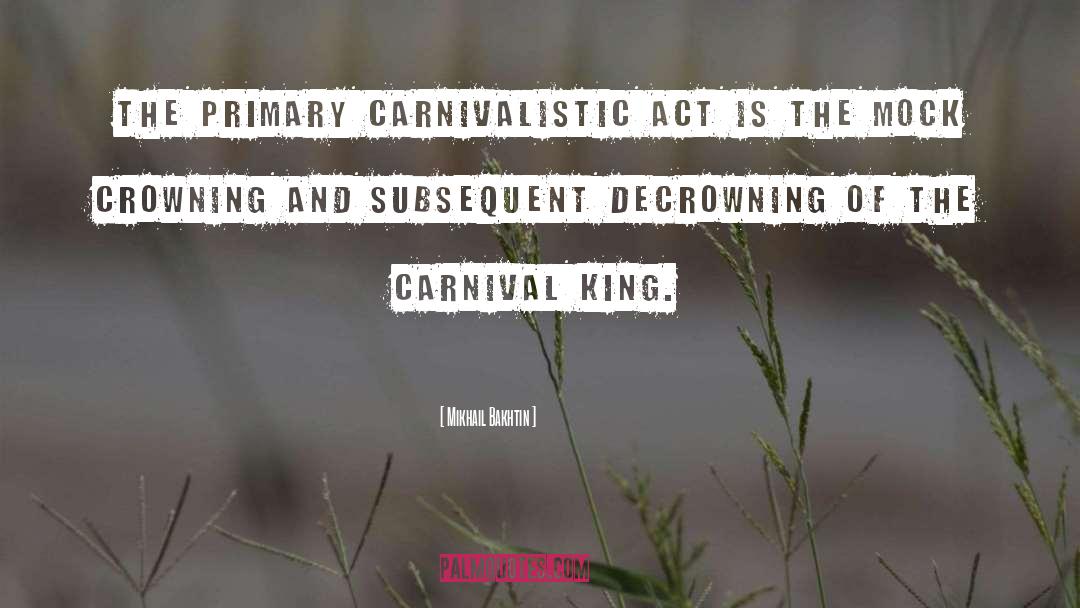
A third characteristic is the deliberate multi-styled and heterovoiced nature of all these genres. They reject the stylistic unity (or better, the single-styled nature) of the epic, the tragedy, high rhetoric, the lyric. ~ Mikhail Bakhtin

Language, for the individual consciousness, lies on the borderline between oneself and the other. The word in language is half someone else's. It becomes 'one's owns' only when the speaker populates it with his own intention, his own accent, when he appropriates the word, adapting it to his own semantic and expressive intention. Prior to this moment of appropriation, the word does not exist in a natural and impersonal language (it is not, after all, out of a dictionary that the speaker gets his words!), but rather it exists in other people's mouths, in other people's contexts, serving other people's intentions: it is from there that one must take the word, and make it one's own. ~ Mikhail Bakhtin
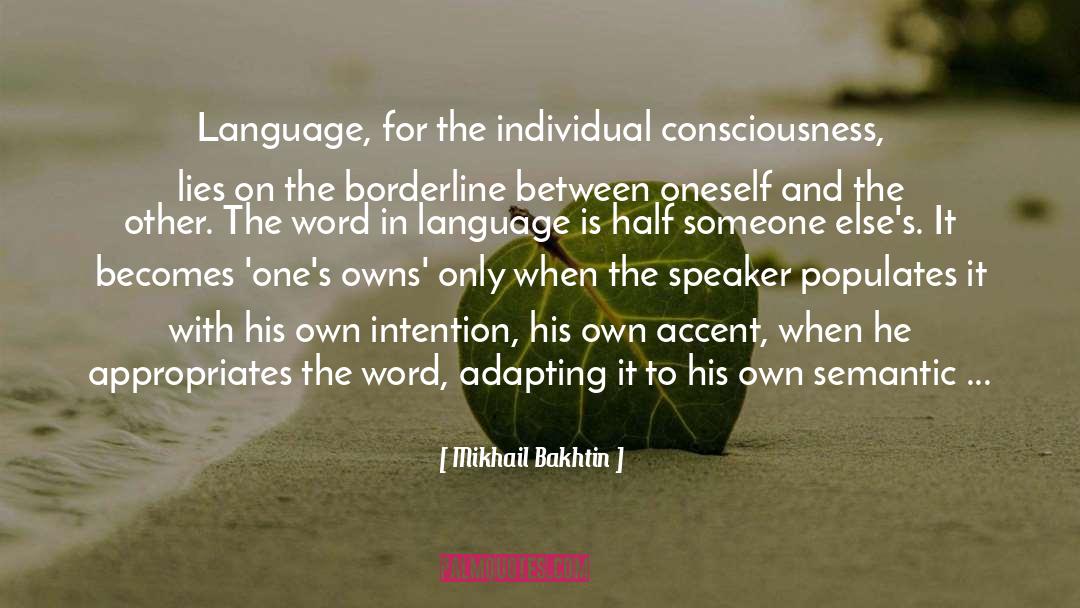
In order to understand, it is immensely important for the person who understands to be located outside the object of his or her creative understanding - in time, in space, in culture. For one cannot even really see one's own exterior and comprehend it as a whole, and no mirrors or photographs can help; our real exterior can be seen and understood only by other people, because they are located outside us in space, and because they are others. ~ Mikhail Bakhtin
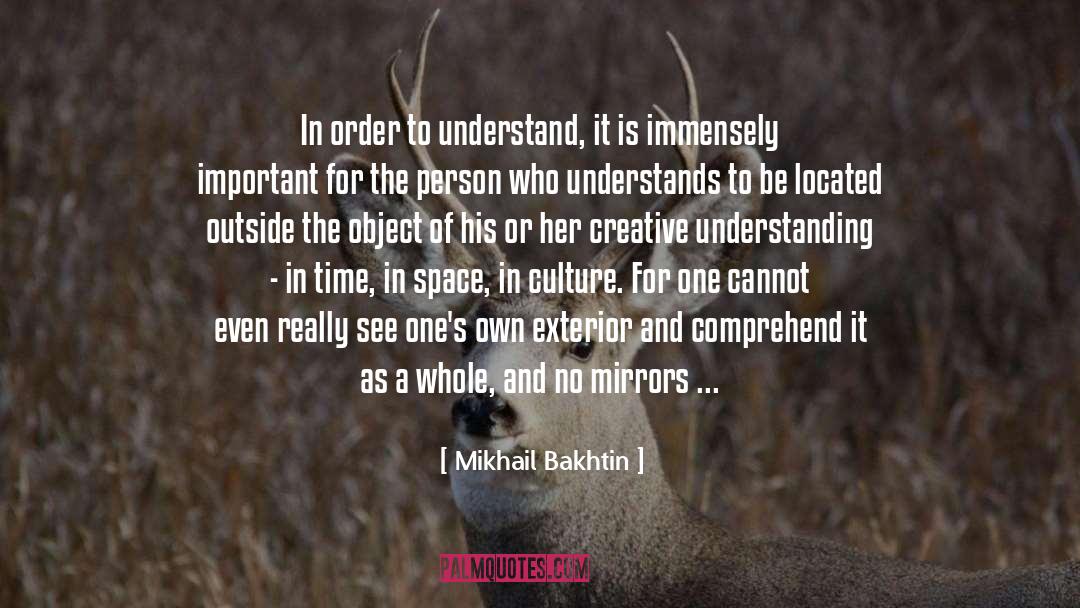
As a result of the work done by all these stratifying force in language, there are no "neutral" words and forms - words and forms that can belong to "no one"; language has been completely taken over, shot through with intentions and accents. For any individual consciousness living in it, language is not an abstract system of normative forms, but rather a concrete heteroglot conception of the world. All words have the "taste" of a profession, a genre, a tendency, a party, a particular work, a particular person, a generation, an age group, the day and hour. Each word tastes of the context and contexts in which it has lived it socially charged life; all words and forms are populated by intentions. Contextual overtones (generic, tendentious, individualistic) are inevitable in the word.
As a living, socio-ideological concrete thing, as heteroglot opinion, language, for the individual consciousness, lies on the borderline between oneself and the other. The word in language is half someone else's. It becomes "one's own" only when the speaker populates it with his own intention, his own accent, when he appropriates the word, adapting it to his own semantic and expressive intention. Prior to this moment of appropriation, the word does not exist in a neutral and impersonal language (it is not, after all, out of a dictionary that the speaker gets his words!), but rather it exists in other people's mouths, in other people's contexts, serving other people's intentions: it is f ~ Mikhail Bakhtin

The Tower is not a sacred monument, and no taboo can forbid a commonplace life to develop there, but there can be no question, nonetheless, of a trivial phenomenon here; the installation of a restaurant on the Tower, for instance ... The Eiffel Tower is a comfortable object, and moreover, it is in this that it its an object wither very old (analogous, for instance, to the Circus) or very modern (analogous to certain American institutions such as the drive-in movie, in which one can simultaneously enjoy the film, the car, the food, and the freshness of the night air). Further, by affording its visitor a whole polyphony of pleasures, from technological wonder to haute cuisine, including the panorama, the Tower ultimately reunites with the essential function of all major human sites: autarchy; the Tower can live on itself: one can dream there, eat there, observe there, understand there, marvel there, shop there, as on an ocean liner (another mythic object that sets children dreaming), one can feel oneself cut off from the world and yet the owner of a world. ~ Roland Barthes

According to Dostoevsky, all is simultaneous, everything coexists. That which has meaning only as "earlier" or "later," which is sufficient only unto its own moment, which is valid only as past, or as future, or as present in relation to past or future, is for him nonessential and is not incorporated into his world. That is why his characters remember nothing, they have no biography in the sense of something past and fully experienced. They remember from their own past only that which has not ceased to be present for them, that which is still experienced by them as the present: an unexpiated sin, a crime, an unforgiven insult. ~ Mikhail Bakhtin

